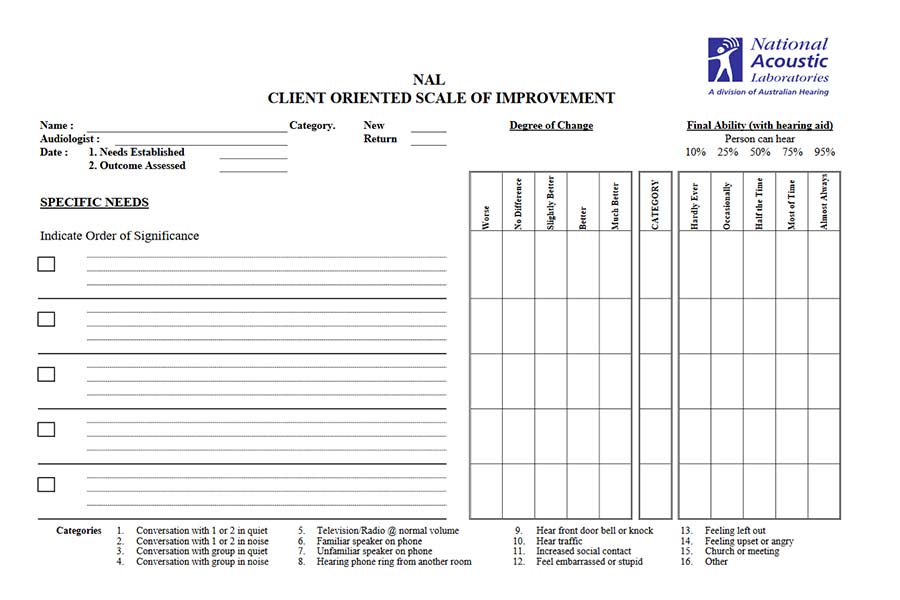Understanding your hearing loss and its impact on your life is very important. It is only through the complete understanding, that you can then assess how well you are doing if you decide to get hearing aids. The COSI (Client Orientated Scale of Improvement) is a simple but powerful document designed by the National Acoustic Laboratory, an Australian hearing research body. They say
"The Client Oriented Scale of Improvement (COSI) is a clinical tool developed by NAL for outcomes measurement. It is an assessment questionnaire for clinicians to use which allows them to document their client’s goals/needs and measures improvements in hearing ability. One of the greatest advantages of the procedure has been to promote a greater focus on the client’s individual needs when designing their rehabilitation program.1."
Basically, you use the document to identify the areas you are having problems in, detail the impact, score how you are doing now, and then come back to it later to score it again after treatment. But it is much more powerful than just a tickbox exercise when used properly, let me explain.
If you click on the image above you will be able to download the COSI
The Problems
The COSI should be undertaken during your initial hearing assessment, although, in fairness, it can be undertaken anytime during the process. The form is designed to identify the problem areas you are experiencing and grade the difficulties you are experiencing. The key to the power of the document is your commitment to exploring the difficulties and being honest about them and the impact that you are having.
Give Details
A Good COSI completely details the situation, so a simple, when I am talking in groups won't suffice. Detail the situation that you are thinking of. So something like, I like to meet up with a group of people once a week, once the conversation is in full flow, I have real problems understanding everyone around the table.
Or, my Grandson comes to visit once a week and when he talks to me, he speaks very softly and I find it very difficult to understand what he is saying.
Or, I and my partner watch the TV together every evening. We like to watch a particular show and the level of volume needs to be much higher for me, which they find a bit too loud.
Talk About The Impact
More than just giving a detailed description, talk about the impact of the problem on you, be honest. No bullshit, big girl and big boy pants on honest. If you are frustrated by the problem, say it, if you are worried that the problem is affecting your relationships, say it. If it makes you feel lost or lonely, say it. Detail the emotional impact on you from these problems.
No Bullshit Big Girl or Big Boy Pants Honest
Being honest about the impact of hearing loss allows you to acknowledge the emotions involved. It is one of the first steps to understanding what is going on and addressing it. It will also allow you to outline where you are and hopefully motivate you to deal with it. One of the first steps to getting over the emotional impact of something is acknowledging it so that you can move on.
You will not be the first person to say that you feel you are losing who you are. You will not be the first person to say that you are hugely frustrated, you will not be the first person to say that you feel grief over a loss. You will not be the first person to say that you feel it is better not to interact rather than be embarrassed. These are natural reactions, don't be embarrassed by them, don't be unwilling to discuss them.
Score Them
When you have finished detailing the problems and the real impact, score how you feel you are doing in those situations. Once that is done, you are finished laying the foundation, you have set the true terms of your problems and you can assess your ongoing journey with it.
Measuring Your Outcomes
Revisit the COSI on an ongoing basis during your hearing aid journey, score each situation as it is with your hearing aids. During your initial rehab period, you will see your score improve exponentially. At the end of the initial rehab and fine-tuning period, you can look at a final score for your improvement in each situation.
It isn't finished there though, during your long term journey with your hearing aids, you can re-visit the COSI many times. It will tell you where you started in your journey and what your ongoing outcomes have been. It can also be used to identify new situations as your journey progresses and your lifestyle changes. Allowing you to identify and deal with ongoing issues.
The COSI is all about you, it will help you to put everything into perspective, identify and acknowledge the emotional impact and finally allow you to assess your progress. That's not bad for a simple piece of paper. Like us on Facebook by clicking the button below to keep up with our latest utterances. Alternatively, if you don't like Facebook, sign up to the newsletter below. It is important to remember, a hearing aid isn't properly fitted unless they do Real Ear Measurement.
1. COSI and HAUQ, https://www.nal.gov.au/products/downloadable-software/cosi-and-hauq/











